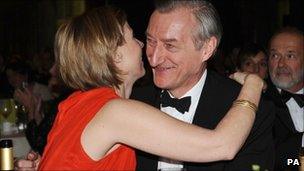Man Booker Prize won by Julian Barnes on fourth attempt
- Published
- comments
Julian Barnes thanked the judges "for their wisdom" and the sponsors "for their cheque"
Julian Barnes has won the Man Booker Prize for his novel The Sense of an Ending, having been shortlisted on three previous occasions.
Barnes - the bookmakers' favourite - said he was "as much relieved as I am delighted" to win the £50,000 prize.
The judges had been criticised for putting a focus on "readability" in their choice of shortlisted novels.
Chairwoman, ex-MI5 boss Dame Stella Rimington, said the publishing world was like the "KGB at its height".
Of Barnes's novel, Dame Stella said it had "the makings of a classic of English literature".
She described the novel as "exquisitely written, subtly plotted and reveals new depths with each reading".
"We thought it was a book that spoke to the humankind in the 21st Century."
In reference to the row over the literary merit of the books the judges chose, she accused her critics within the publishing world of resembling the Russian security service for their use of "black propaganda, de-stabilisation operations, plots and double agents".
She said the judges had followed the debate "sometimes with great glee and amusement".
"We were talking about readability and quality. We were certainly always looking for quality as well," she said. "That fact it's been in the headlines is very gratifying."
Barnes, in his acceptance speech, said: "I'd like to thank the judges - whom I won't hear a word against - for their wisdom. And the sponsors for their cheque."
Thanking the book's designer, Suzanne Dean, he added: "Those of you who've seen my book - whatever you may think of its contents - will probably agree that it is a beautiful object.
"And if the physical book, as we've come to call it, is to resist the challenge of the e-book, it has to look like something worth buying and worth keeping."
Industry paper The Bookseller reported that publisher Random House is now reprinting 75,000 copies of Barnes's book following its victory.
Waterstones said it had ordered extra copies of the book, while WH Smith said it would feature the title in an upcoming promotion.
'Rather boring'
The shortest novel of the six finalists, The Sense of an Ending is about childhood friendship and the imperfections of memory.
It is narrated by a middle-aged man, Tony Webster, who reflects on the paths he and his friends have taken as the past catches up with him via a bequeathed diary.
Dame Stella said that although the main character appeared at first to be "rather boring", he was gradually revealed to be somebody quite different.
The former spy chief added: "One of the things the book does is talk about humankind. None of us really know who we are - we present ourselves in all sorts of ways."
The other nominees were Carol Birch (Jamrach's Menagerie); Canadians Patrick deWitt (The Sisters Brothers) and Esi Edugyan (Half Blood Blues); and debut authors Stephen Kelman (Pigeon English) and AD Miller (Snowdrops).
Barnes had been shortlisted for the prize on three previous occasions, without success.
The London-based author was nominated in 1984 for Flaubert's Parrot, in 1998 for England, England and in 2005 for Arthur and George.

Barnes had been shortlisted for the Booker on three previous occasions
Dame Stella said the five judges had reached a final, unanimous decision after about half an hour of debate on Tuesday.
"I can tell you there was no blood on the carpet and nobody went off in a huff," she said.
Her fellow Booker judges were writer and journalist Matthew d'Ancona, author Susan Hill, author and politician Chris Mullin and Gaby Wood of the Daily Telegraph.
Despite the literary row, this year's shortlist has been the best-selling in Booker history - sales of the shortlisted novels are up 127% on last year.
According to Nielsen BookScan, 98,876 copies were sold in the six weeks after the shortlist was announced.
Snowdrops has sold most, shifting more than 35,000 copies since it was shortlisted. Next is Jamrach's Menagerie with 19,500 and The Sense of an Ending with 15,000.
The Booker nominees read excerpts from their works
Barnes's book has sold more than 27,500 copies since it was published in early August.
At 150 pages, it is not the shortest book to win the Booker. That record is held by Penelope Fitzgerald's 132-page Offshore, which won in 1979.
Commenting on the winner, Jonathan Ruppin of booksellers Foyles said: "As a writer characterised by immense intelligence and imagination, it would have been remarkable if Barnes had never won the Booker.
"This is definitely one that splits opinion, with some finding it subtly powerful and others frustratingly underdeveloped. But great writers rarely please everyone."
- Published19 October 2011
- Published18 October 2011
- Published13 October 2011